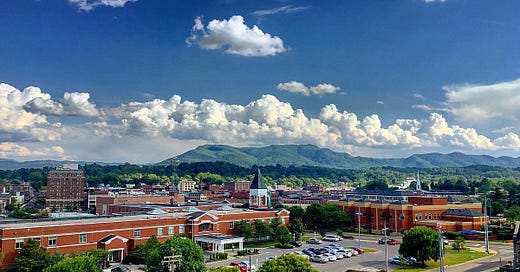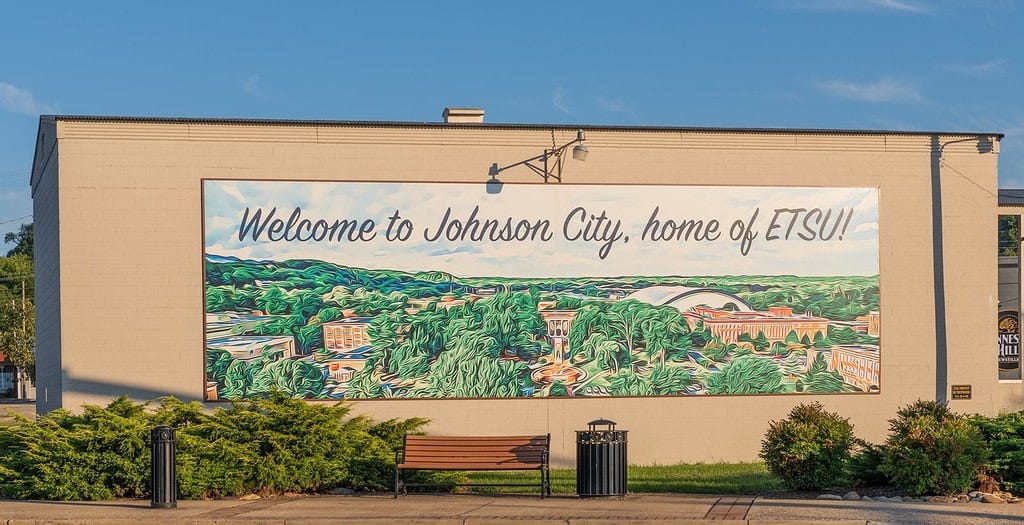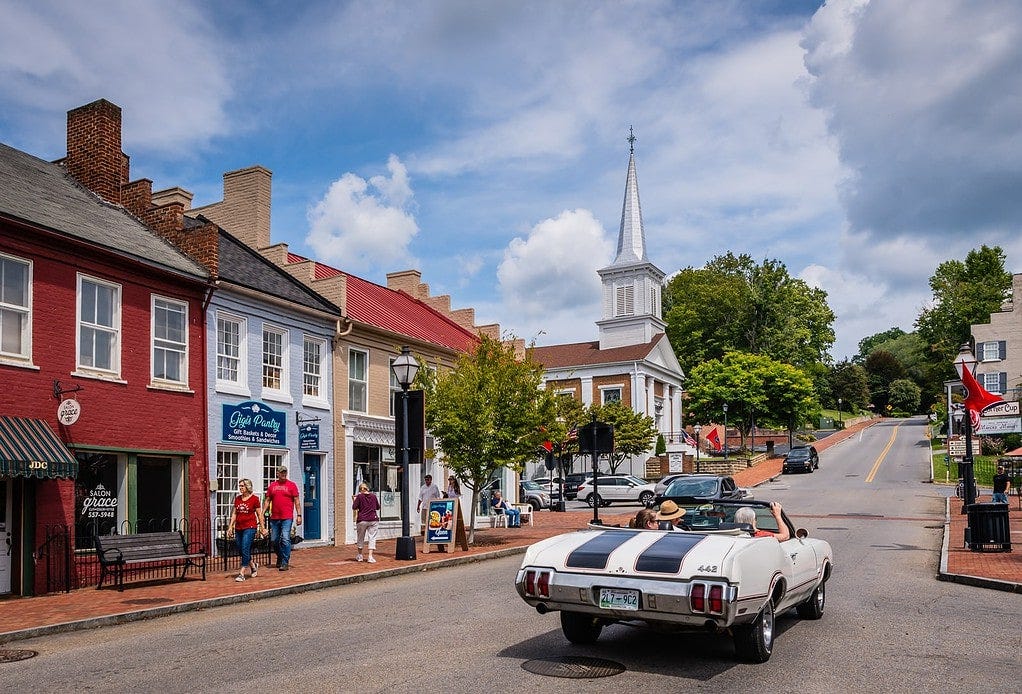From North to South: Savoring the Southern Hospitality
Part 1 | How climate influences behavior and well-being: moving from Romania to Tennessee, in Southern Appalachia.
I could hear my roommate playing her banjo in the living room. I was studying for my Communication Theory class and the high-pitched sounds permeated through my bedroom door. It seemed like she was rehearsing day and night. It was only an hour every afternoon when she came back from class, but it was more than I’d ever heard banjo sounds in all of my 23 years of life.
She kept going over what seemed to be the same song again and again. Sometimes, her American boyfriend would come over, and they played the banjo together. Two banjos in the house three times a week. Talk about an immersion in the American South.
I had left my native Romania less than two months before. When I landed in the Tri-Cities area of north-eastern Tennessee I might as well have landed on a different planet altogether. The language was not like the kind I heard in Listening Class back home. The people were loud, cheerful and they were huggers. The store cashier ladies called me ‘honey’ and smiled while taking my money. I was in the belly of the Old South and getting a taste of Southern hospitality.
When she would take a break from her banjo, my roommate would come knocking at my bedroom door and, smiling a wide smile of bleached teeth, she would ask: how’s y’all day going? Say what, I thought the first time I heard that.
The dialect the locals spoke seemed funny to us, the international students on campus, who had learned English in class and not at home. The vowels were long drawn out, especially the ‘o’. The locals spoke with their tongue pushed far back in their throat. ‘Life was like a box of chocolates’ became ‘Laafe waas laaake a boux af choclates’ from the mouths of my Tennessean hosts. Some would say their speech sounded lazy. For me, it seemed that people had time back in Tennessee. There was no rush, especially not in articulating one’s thoughts.
Language has such a constant presence in every nook and cranny of our days, from dawn till dusk and beyond. Hearing that southern accent day in and day out was the acoustic reminder - together with that banjo - that I was in a completely foreign place compared to my native country.
Leaving serious, austere Romania where still no one smiled in photos to get to a place where people embraced me from the first moment, was a lucky, cosmic accident.
I was coming from a northern-type culture dominated by study, silence and, as a result, loneliness. Maintaining the silence so I could study had been the recipe for getting out. Leaving the post-communist regime in search of a better life.
I was a northerner1 going to the south, but unlike other northerners, I didn’t feel out of place, bewildered by sounds, colors, late-night dinners, and people being overly touchy. It was the first time in my life that I felt I was in the right place. I felt I was home, a home I never knew I had been searching for.
On Friday evenings, my American roommate would put on her cowgirl boots, regardless of the season, and take me to her favorite spot, Poor Richard’s. This bar, right on the edge of the campus, where locals gathered and foreign students like me mingled, gaping wide-eyed at the cultural experience. Poor Richard’s had a wooden platform rink in the middle of the bar where locals performed line dances on country songs, smashing their heels into the floorboards.
Some other days, we’d drive in my roommate’s pick-up truck to Cracker Barrel, off Interstate 26. The restaurant seemed to be a museum to my Eastern European eyes. Decorated like a traditional general store you’d expect to see in Western movies, it served dishes I’d never heard of in my life. From hash brown casserole to biscuits and gravy, and corn muffins, I tried them all, in time, at Cracker Barrel.
The biscuits were not at all what I expected. I confused them with the French biscuit, which is a sweet cracker or cookie. But these biscuits were fluffy and airy savory dough buns covered in gravy. I couldn’t get enough of them. The place was big and loud, the wooden tables were close to one another, people laughing and telling stories in that drawn out, lots-of-oh-s Southern speech. At the end of the meal, on your way out, you could sit in a tall wooden rocking chair on the front porch of Cracker Barrel and pretend to be Scarlett O’Hara for five minutes.
The Deep South was not just cultural; climate played a part in it too. Here, people seemed more cheerful and more relaxed than I’d ever seen before.
This idea goes all the way back to the 17th century. The French philosopher Montesquieu put out the idea that climate differences help to shape human societies. Current research on the nature of human behavior states that “individuals who grew up in regions with more clement temperatures scored higher on personality factors related to socialization and stability.” When the weather is pleasant, we go outside more often, meet other people and naturally engage in social activities with them.
When northerners travel south, such as Germans holidaying in Spain or New Yorkers going to the Bahamas, they usually approach the place they visit as a temporary distraction. I find that for northerners, there is a psychological split between everyday life and fun or leisure. Travelling south is not real life, but a mere country fair of sorts. For many northerners, southern countries are too chaotic and un-orderly for daily life.
But when this northerner went to the American South, I experienced it like a breath of fresh air after being underwater for too long. I fantasized about having a mixed ancestry with the locals. There must be a thread in my genes that comes from somewhere warm, bathed in olive oil scent. Somewhere with leafy tropical plants and yellow dust for earth. When I went to Tennessee, I found a piece of that thread and I wouldn’t let it go.
I remember thinking at times ‘my life starts now’. And I announced the beginning of my new life with a roar one weekend in the Cherokee National Forest. Jumping from a rock up high, holding hands with a boy, straight into Watauga Lake, I screamed my lungs out, exhilarated by the new life I was starting.
Discovering that in the South I felt more like home than in my country of birth would dictate the choices I would make from then on.
I would always be on the hunt for that warm, good-life, comfort feeling I found in Southern Appalachia. The places I found since then might be on the other side of the planet, but they will always be deeply connected to the thread I spun in north-eastern Tennessee.
Calling myself a ‘northerner’ doesn’t necessarily reflect the geography of my country of birth, which is located roughly parallel to northern Italy. I am a northerner in the way I was brought up, the culture in Romania and in my family, due to the post-communist regime and a harsh winter climate.
Next, please read Part 2, about the opposite journey:
From South to North: Grappling with Loneliness
It was an early July day in the summer of 2008. I was 26 and, after having crossed the Atlantic once and gotten deeply permeated by the Southern US culture, I was on a plane back to the old continent. But I wasn’t re…










Awe, having lived in Asheville for nearly 20 years, this makes me homesick 🥰
This is great! I had the opposite experience: I went from the US South to Romania and Moldova. Instead of smiling and handing the money to the cashier, I stopped smiling and started putting my money on the counter or in the tray/dish in front of the cashier. And instead of being called terms of endearment like 'honey,' I was asked, "Why don't you speak Romanian?" I went from foothills of the US South to the Carpathian Mountains. From corn muffins to plăcintă.